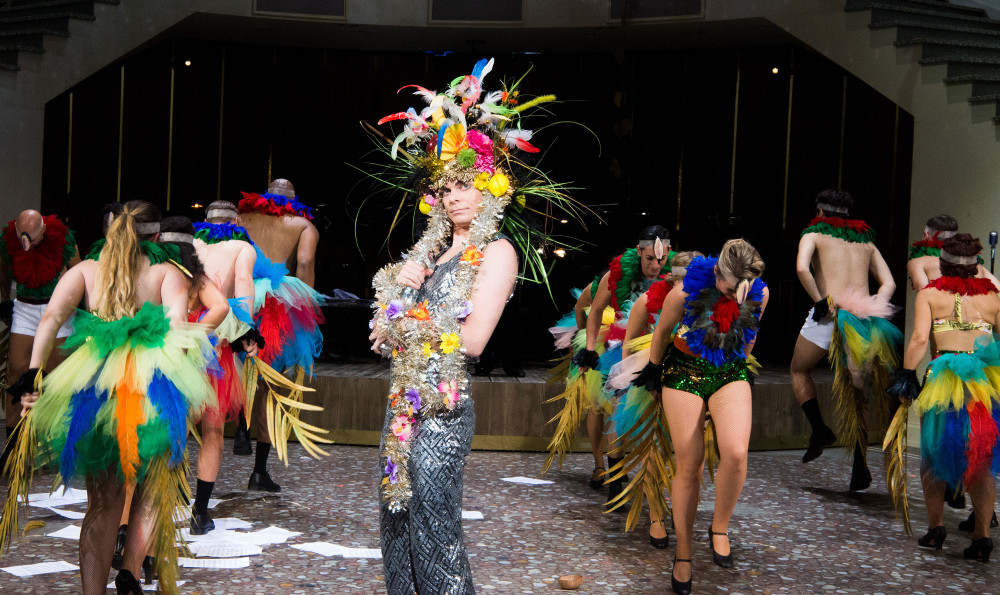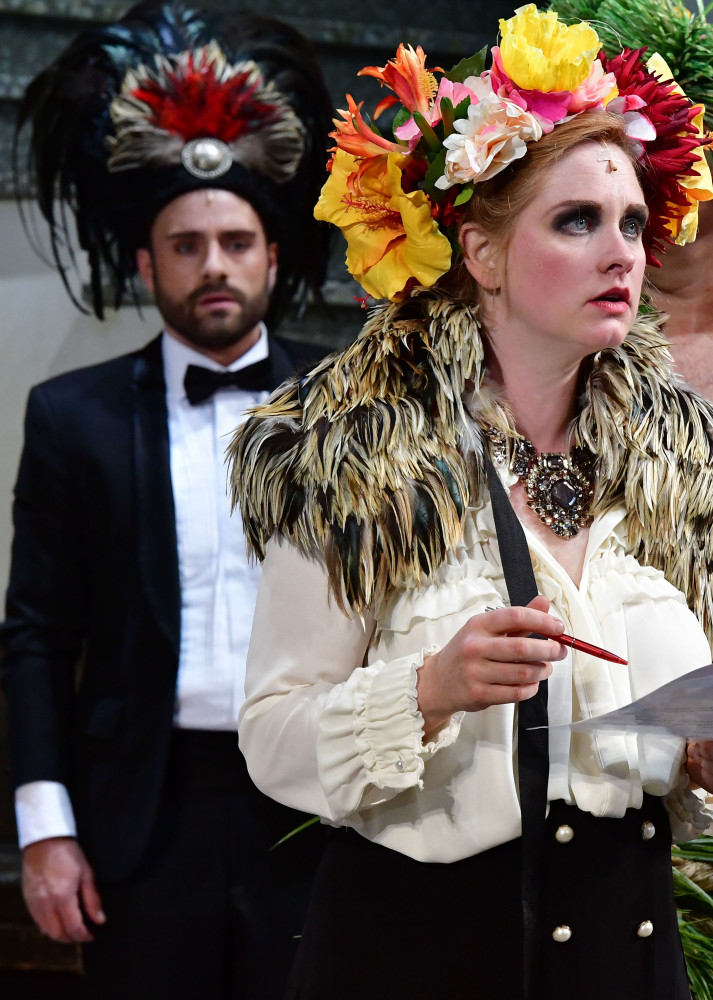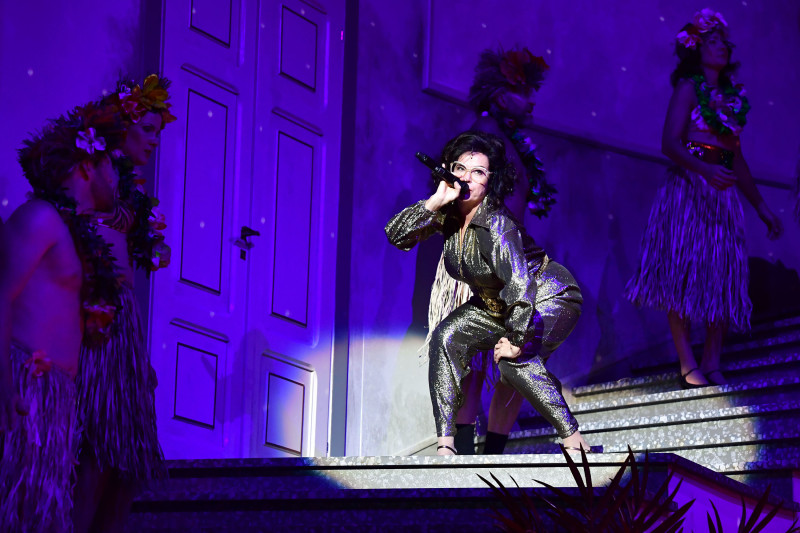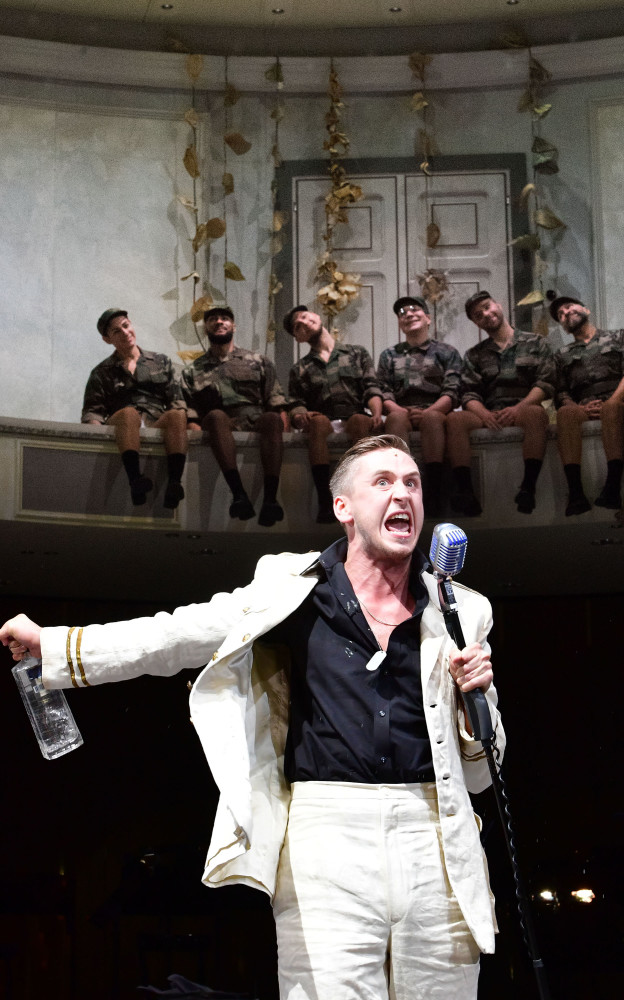Kevin Clarke / Thomas Krebs
Operetta Research Center
2 October, 2017
The Theater Basel has presented us with a brand new production of Paul Abraham’s 1931 Die Blume von Hawaii. Recently, the original score was reconstructed by Henning Hagedorn and Matthias Grimminger, to allow us to experience once again the distinct ‘Weimar Republic’ sound. The opera house in Dortmund were the first to perform the show in this reconstructed version. Basel opted for a different approach: instead of letting the opera department handle the show, they decided to give it to the drama department, i.e. actors instead of opera singers perform all roles. The large Abraham orchestra is reduced to a smaller band, playing a slimmed down arrangement on the basis of H&G. Frank Hilbrich is the stage director whom you might remember from his Vetter aus Dingsda in Bremen. (With a similar stage arrangement, including an on stage orchestra.)
One of our Swiss colleagues, researcher Thomas Krebs, went to the premiere with high expectations. What he saw, however, infuriated him so much that he sent the Operetta Research Center a candid email, voicing his frustration. It’s not an official review, but it touches upon many aspects that we find worth discussing. Which is why we have decided to post Mr. Krebs’ email, with his consent. And to avoid any confusion: he bought his own ticket, so did not attend as an official critic on a press ticket. We include press photos supplied by the Theater Basel to give you a visual idea of the evening.

The “Blume von Hawaii” at the Theater Basel, 2017. (Photo: Sandra Then)
So I went to Basel after all to see the new Blume von Hawaii production last week-end. Because of throat problems of various performers, the original opening night had to be moved from Thursday to Sunday. But I actually only saw half of the performance, because I left during the interval.
I had expected something cheeky, sparkling, light hearted, something with verve that’s unafraid of kitsch elements. Maybe even something slightly edgy. (The one doesn’t have to exclude the other.) Instead, what I saw was to me mostly crude and silly, in a rather laboured way. On top of everything else, although I enjoyed the inspired playing of Henneberger and the Ensemble Phoenix, when it came to the treatment of the songs the whole thing was strangely stale, musically speaking. The sets and costumes didn’t do anything to redress the balance… Dreadful!

Florian Jahr as Prinz Lilo-Taro and Pia Händler as Laya, Prinzessin von Hawaii. The “Blume von Hawaii” in Basel. (Photo: Sandra Then)
If any of this was intended to be ironic, I just didn’t get it. There certainly was not much entertainment value. And what’s Abraham without entertainment? I had the feeling that this operetta was being dumbed down in a rather disrespectful way. Making the show a tad boring and leaving this spectator quite cold.
The only thing I really liked was the decision to use actors rather than opera people. Their way of singing Abraham – when the stage gimmicks didn’t get in the way too much – made the first part before the interval quite bearable.

Katja Jung as Bessi Worthington in “Blume von Hawaii,” Basel. (Photo: Sandra Then)
One week earlier, there had been a matinée preview with some of the people involved in the production. Frankly, I was surprised by how unprofessional some of this was with respect to the information given. The director of the acting department of Basel , Almut Wagner, who is also the dramaturg for Blume von Hawaii, did not mention once that Abraham was forced into exile because he was Jewish. She also claimed that he died in 1956. When she referred to Viktoria und ihr Husar she spoke of “Veronika und der Husar” (twice) until stage director Frank Hilbrich and conductor Jürg Henneberger corrected her.

Elias Eilinghoff as Kapitän Reginald Harald Stone in “Blume von Hawaii,” Basel. (Photo: Sandra Then)
What the show’s director Frank Hilbrich had to say was actually quite interesting, but I wondered why, when he mentioned that Abraham represents the final blossoming of operetta in the early 1930s, together with composers such as Kalman and Stolz, he referred to the latter as “the young [sic] Robert Stolz” [who was twelve years Abraham’s senior…].
To tell the truth, I had been looking forward to a good Abraham production, not stuffy and old-fashioned, but young and energetic, one I did not have to travel all the way to Berlin for. As I did two years ago for Ball im Savoy at the Komische Oper. That was so good, I went twice in a row.
Instead, the Basel production seemed to me infantile without ever being really funny. But maybe the rest of the Basel audience sees this differently?
At least the reviewer from TagesWoche speaks of the “great joy” this production gave him, and he calls Henneberger’s conducting “refreshing,” even thought some of the songs are “Schnulzen,” according to Dominique Spirgi. To read his review, click here. Alexander Dick from the Badische Zeitung also wrote a mostly positive review (“Aloha – o weh?”). His verdict: “[Frank] Hilbrich works – as is typical in drama – with many pauses and experimental dialogue. But the piece needs tempo, otherwise it dies immediately. The production also shows that it’s not easy to turn a large scale revue operetta into a chamber piece. Simply because it’s missing the proper substance for that. Still, the evening managed to fullfill its goal of presenting a contemporary Blume von Hawaii. Why? Because the clichés and prejudices are still the same [as in 1931]. One phrase of a ‘young Hawaiian’ girl called Raka is turned into the cheeky leitmotiv of the evening: ‘This here has absolutely nothing to do with Hawaii.’” (To read the full review in German, click here.)
For more information and performance dates, click here. If you visit the theater’s homepage you can see a video in which the actors talk about the production; it gives you some idea of the “infantile” humor Thomas Krebs refers to.

The bigger problem is that too many people think that you have to have either an actor or singer perform these roles- you need to have both. In this day and age there are loads of people that are talented enough to do both. I saw a video of Ball im Savoy by the Komisch Oper and was mortified to find out that the lead female could not sing the role as written- it was kitsch for kitsch sake- a terrible representation of not only the music but the show in itself. We put on a much truer production in Chicago that was honest, heartfelt, funny and faithful to what Abraham intended- and we found singers to boot that could really act. We were able to find those moments of honesty in the piece that made the show so enduring when it came out- even with our tiny budget which is 1/20th of the Komisch Oper. I am sure that Die Blume von Hawaii is suffering from the same malaise that Savoy did- high on clever production values with no emphasis on great singing and acting.
Gerald Frantzen
Artistic Director
chicagofolksoperetta.org
Operettas always have to adapt to the time and place where they are performed. What Barrie Kosky managed to do in Berlin – with BALL IM SAVOY and the various following operetta productions – was to find a style and a type of casting that attracts a big city audience, and enthralls it. Maybe it wouldn’t work in Chicago, but it sure works in Berlin. And that is a great achievement. Kosky also managed to make people – and critics – look at these long forgotten and neglected shows anew, with fresh and keen interest. If you, Gerald, did not like this BALL IM SAVOY, that’s perfectly okay. But it’s put Abraham back on the map in Germany, on a grand scale. Which is a miracle. And the performances are nearly always sold out, after all these years. I personally have seen it many times over, and I absolutely love Dagmar Manzel and Katharine Mehrlin in the two lead roles. Yes, Manzel is more convincing and sensational in EINE FRAU DIE WEISS WAS SIE WILL and PERLEN DER CLEOPATRA, but her Madeleine de Faublas has grown into something very very special with time. And the two ladies deliver a knock-out performance that certainly redefined ‘operetta’ in modern-day Germany.
I agree that operetta’s have to adapt to the time and place where they are performed but… what if Dagmar could really sing the role? She is an incredible actress. That is a no-brainer. And yes the production was fresh- I loved the idea, I loved the scale and I loved that it has inspired an incredible revival of these works, not only in Germany but in the rest of Europe as well (including our little company in Chicago). Would that production have worked here? I am not sure. I will say that we are a theater town and one of the better ones. Certainly as one the largest U.S. cities with a vibrant cultural scene, first-rate symphony orchestra, a great opera company, great art schools, and one of the premiere dance companies in the world we have seen a little bit of everything. My point was not to denigrate the production but to point out that this incredible genre which so firmly sits between “hoch und “populär” culture needs to be everything to everybody- and this includes great singing. Kálmán was a serious composer who wrote incredible music that doesn’t need either an actor or singer, but, respectfully, both. I enjoyed the production but was underwhelmed by the singing. I worked in Germany for a couple of years and know that there are a lot of great singers and actors that could have done that role as demanded and still hit every note, even in a Barry Kosky production.
The Manzel role was – obviously – written for a world-class oepra soprano. She could not have coped with it, seriously, under any circumstances. And luckily, she did not even try. She turned the whole role into something new. Just like Massary made the Merrx Widow something unique, as did Joan Sutherland, by the way. They both have nothing in common with the original performer of 1905. (The same is true for nearly every latter day Danilo. Noone seems to mind that either.) Watching Dagmar many times in BALL IM SAVOY I noticed how she became more and more comfortable in the role, and found her very own way of singing it. Creating some heart-stopping moments, thanks also to Adam Benzwi at the piano. They created magic together. (In that last act lamento especially.) I can imagine other singers in the role, and they would probably sound better. But Dagmar’s acting made the whole show emotionally believable, she made the entire dialogue interesting and full equal to the musical parts. And she (eventually) turned the stage into a grand diva duel with Katharine Mehrling, which was stunning to watch. A real battle of extravagent personalities. (I image Gitta Alpar and Rosy Barsony had a simular duel on stage.) Anyway, for me this Berlin BALL was a relevation. And seeing Manzel in her later shows…. I can only say she got more and more amazing. Her Cleopatra is a non plus ultra knowout. And her FRAU DIE WEISS WAS SIE WILL – together with Max Hopp – is again one of the most glorious operetta experiences of my life. She actually sounds (!) great in both these Oscar Straus parts too. And because of all this, I forgive and forget every shrill Abraham note.